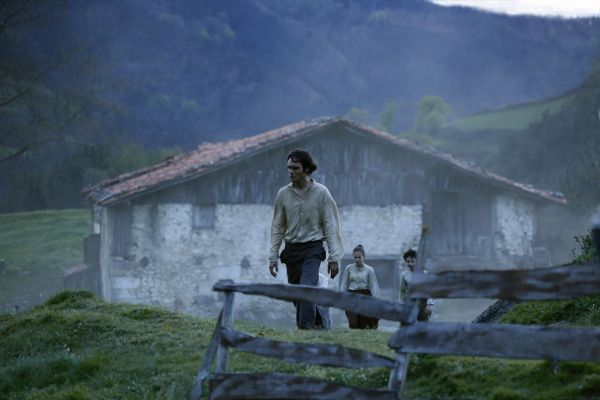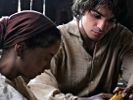Eye For Film >> Movies >> Giant (2017) Film Review
Giant
Reviewed by: Amber Wilkinson

One of the success stories of the 2014 San Sebastian Film Festival - and by extension, the festival's long-term commitment to Basque film - was Flowers (Loreak), an elegant, slow-burn drama about connected lives that was the first Basque film to play in the competition section of the festival and went on to be Spain's nomination for the Foreign Language Oscar.
Aitor Arregi and Jon Garaño, writing with Jose Mari Goenaga and Andoni de Carlos, choose a much bigger canvas for their follow-up film Giant (Handia), an historical drama based on the true story of the son of a farmer who suffered from gigantism. Beginning in the 1830s, Martin (Joseba Usabiaga, who British audiences might recognise as the lead in romcom Pikadero) and his brother Joaquin (Eneko Sagardoy) are living an unremarkable life on a farm on the outskirts of Altzo. As the First Carlist civil war tightens its grip, Martin is drafted and soon finds himself in woodland skirmishes. Arregi and Garaño, benefit from the talents of notable Basque cinematographer Javier Agirre (Loreak, Amama), and prove adept at the fight scenes, grounding the hand-to-hand combat in blood and mud, before Martin is left too injured to fight.

This early part of the film is essentially used to set up Martin's feelings of isolation from his family and, when he returns, he discovers his younger brother has grown to an enormous size. Initially torn by a promise to his brother and dreams of leaving for America, Martin soon comes to see that Joaquin's size could prove to be a boon for the family coffers and sets up a tour with the help of an impresario, dragging him places under cloak of darkness - or simply under a cloak - before making him 'perform' for cash.
There's no missing the themes of the film, namely a sense of identity and the ability and inevitability - on-the-nose scripting bashes us on the head with this latter point at regular intervals. The former is underlined culturally by Joaquin's use of the Basque language, while Martin desperately tries to integrate and ingratiate himself with the Castilian Spaniards and beyond. Joaquin is also shown to be troubled by the nature of his predicament which means his body is continually changing around him, never letting him settle as 'himself'. There are shades of Frankenstein's monster about this as well, as Joaquin struggles to reconcile his sense of self with the myth that has been created for him by Martin.
The adapt to survive element of the script also speaks to the way that cultural identity risks being lost in the race to globalisation - an issue that is as fundamental to Spanish politics and many other smaller regions in Europe today as it ever was. The filmmakers are quick to underline that Martin wants to go to America, not necessarily in search of a better life, but in search of a different one, and the tension this causes is partially what drives the film.
Technically speaking, the package is impressive, with the height of Joaquin always believable, although away from the battlefield the historical elements have a stagey feel. There's also a reliance on symbolism - such as a wolf motif - that remains undeveloped. The story, built on the shifting relationship between the two brothers, holds considerable interest, even though the plot starts to ramble. As the pair of them find themselves on a tour of Europe and Arregi and Garaño lose emotional focus in favour of a postcard tour, which means the places may change but the content of the encounters remains largely the same. The filmmakers have certainly achieved a much bigger picture, in terms of look and theme, but it lacks many of the smaller unexpected humanistic details that made Loreak so memorable.
Reviewed on: 25 Sep 2017















